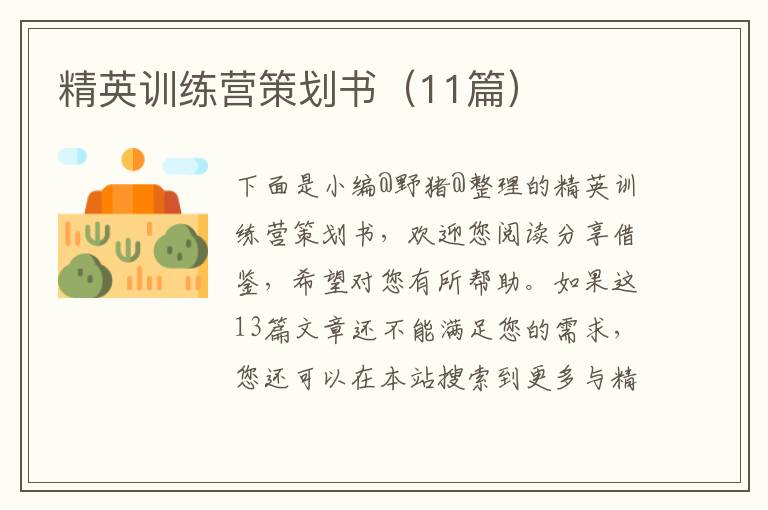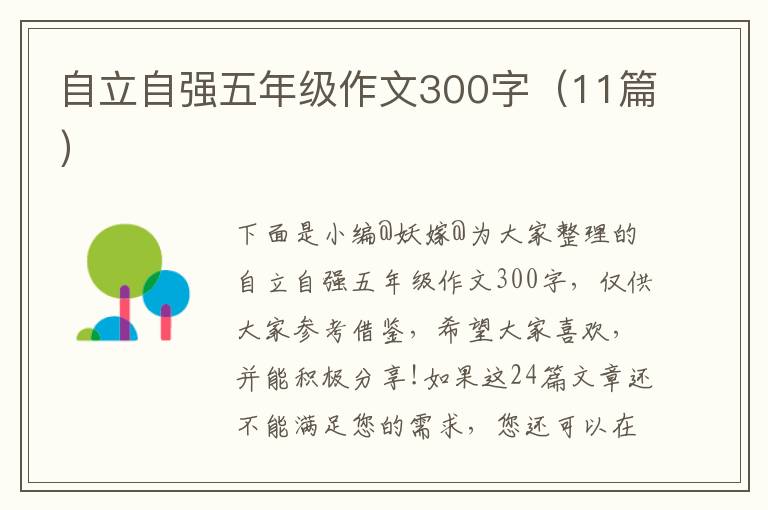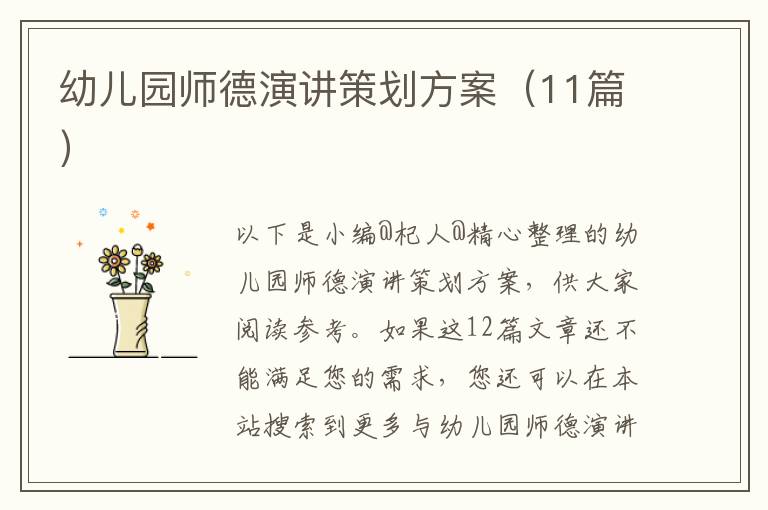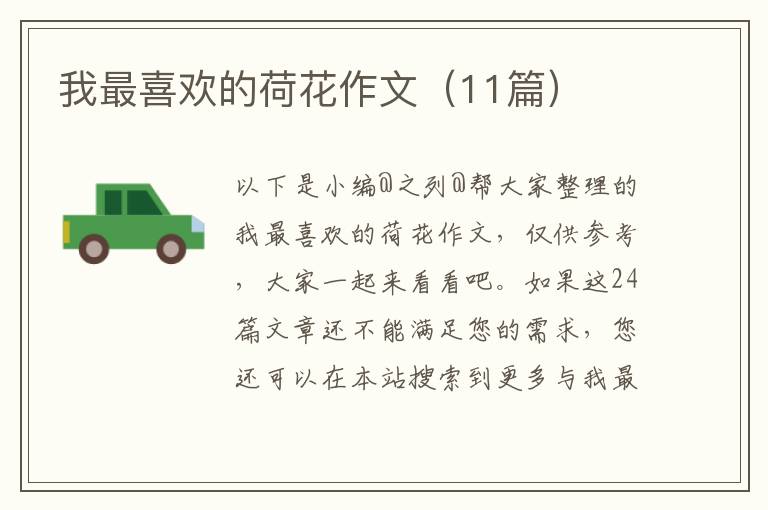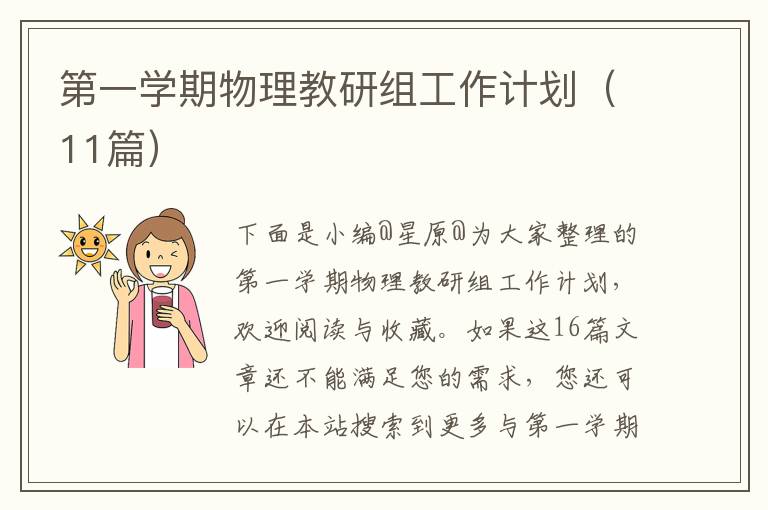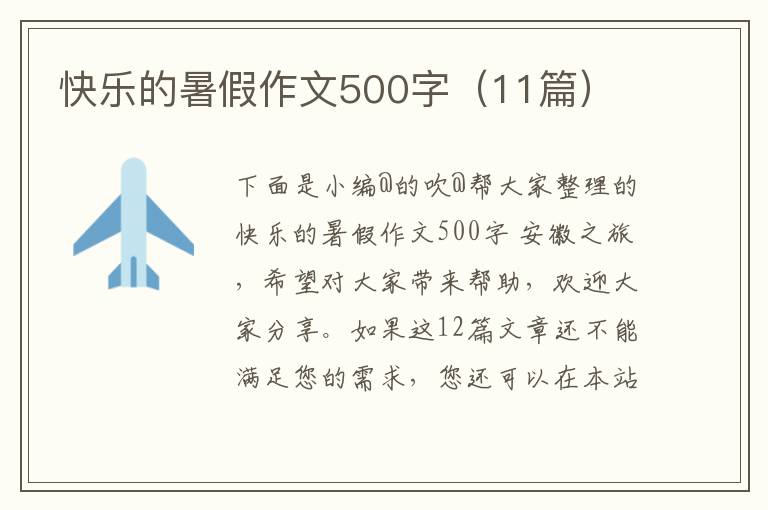九年级英语二单元课件(11篇)
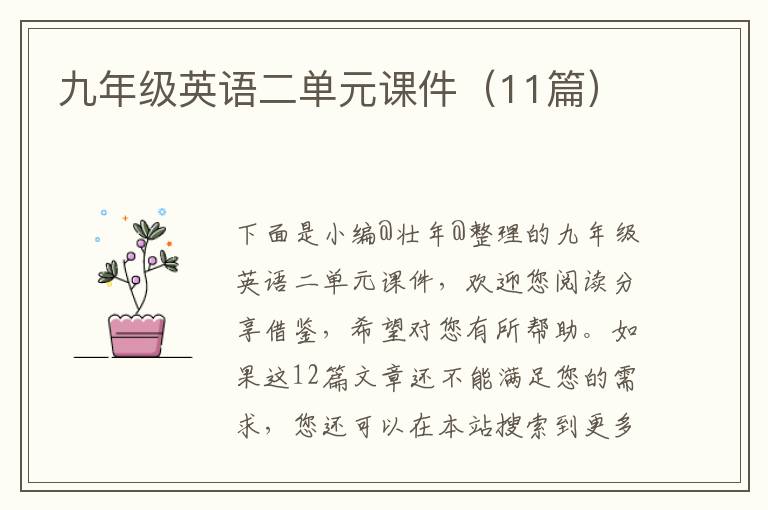
下面是小编@壮年@整理的九年级英语二单元课件,欢迎您阅读分享借鉴,希望对您有所帮助。如果这12篇文章还不能满足您的需求,您还可以在本站搜索到更多与九年级英语二单元课件相关的文章。
篇1:九年级英语二单元课件
九年级英语二单元课件
【课 题】
Unit 2 I think that mooncakes are deliciou
Section A 1a-1c 教师复备栏或
学生笔记栏
【学习目标】
掌握生词lantern /lnt (r)n/ n. 灯笼 p.9
掌握短语What a great day! kind of like
掌握感叹句结构、直接引语和间接引语
【学习重点难点】掌握感叹句结构、直接引语和间接引语
【学法指导】运用已有经验--听---说---听力训练—作业巩固
【教学过程】
一、导入(启发探究 3分
你知道下面这4种节日的英语说法吗?试试吧!
泼水节 龙舟节
春节 元宵节
有关这4种节日的来源、传说、习俗、饮食、文化、庆祝方式有哪些?你能说出一些吗?
二、自学(自主探究 6分钟)
找出4种节日的英语,朗读并记忆,完成1 a
泼水节 Water Festival 龙舟节 the Dragon Boat Festival
春节 The Spring Festival 元宵节 the lantern Festival
三、交流(合作探究 10分钟)
听力训练,完成1b
1、朗读1b句子,理解含义
2、 Listen and circle T for true or F for false.
3、同桌核对答案
4、听后填空
Mary: What a day!
Bill: Yes, it was really fun !
Mary: What did you like best?
Bill: I loved the ! They were really to watch. How fantastic the boat teams were!
Mary: Yes! And look at the colors of the boats. How they were!
Bill: I agree! But I guess it was a little too .
Mary: I don’t know…I kind of like to have more people around. It makes things exciting.
Bill: That’s true. Oh, and I really liked zongzi.
Mary: Oh, me too! The sweet ones are my favorite.
Bill: I if they’ll have the races again next year.
Mary: Of course! They have them every year.
Bill: Then I believe that I’ll be back again next year to watch the races!
Mary: Me, too!
5、朗读听力材料,勾画短语
What a great day! kind of like
It makes things more exciting be back again to + V
感叹句结构
感叹句是表示喜怒哀乐等强烈感情的句子。一般说来,感叹句是由 what 或 how 开头的,其余与陈述句结构相同, 句末用感叹句,朗读时用降调。
由what引导的感叹句
what修饰名词或名词短语,有以下两种形式:
1. What+a(an)+(形容词)+单数可数名词+主语+谓语!如:
What an apple this is!
What a fine day it is!
2. What+(形容词)+可数名词复数或不可数名词+主语+谓语!
What kind women they are!
What nice music it is!
由How引导的感叹句
how用来修饰形容词、副词或动词。其结构是:How+形容词(副词)+主语+谓语! How hard the worker are working!
How clever the girl is!
How quickly the boy is writing!
6、给下列句子加上适当的主句Mary Bill thinks guesses believse让其成为宾语从句:
They were really interesting to watch
The colors of the boats were pretty
It was a little too crowded.
It makes things more exciting.
They’ll have the races again next year.
I’ll be back again next year to watch the races!
四、总结(引深探究 15分钟)
再次朗读1b句子,理解结构
直接引语和间接引语
引述别人的'原话叫直接引语,用自己的话转述别人的话叫间接引语。一这两种引语都是宾语从句,但直接引语放在引号内,不用连词连接;间接引语不用引号,通常用连接词与主句连接.
典型例句:1. She said ,” I like English very much. “ (直接引语)
(她说:“我非常喜欢英语”。)
典型例句:2. She said she liked English very much. (间接引语)
(她说她非常喜欢英语。)
直接引语变间接引语(一)
人称变化
人称变化可以遵循如下顺口溜“一随主,二随宾,第三人称不更新”。
“一随主”是指在直接引语变间接引语时,如果从句中的主语是第一人称或被第一人称所修饰。从句中的人称要按照主句中主语的人称变化
Eg:She said. “My brother wants to go with me.”
→She said her brother wanted to go with her.
“二随宾”是指直接引语变间接引语时,若从句中的主语及宾语是第二人称,或被第二人“你”所修饰,从句中的人称要跟引号外的主句的宾语一致。如果引号外的主句没有宾语,也可以用第一人称
Eg:He said to Kate,“How is your sister now?”
→He asked Kate how her sister was then.
“第三人称不更新”是指直接引语变间接引语时,如果从句中的主语及宾语是第三人称或被第三人称所修饰从句中的人称一般不需要变化
Eg:Mr. Smith said,“Jack is a good worker.”
→Mr. Smith said Jack was a good worker.
五、练评(包含“考点链接” 应用探究 6分钟)
I 选填How What完成感叹句练习
1. ____ great fun it is to swim! 2._________ useful book this is !
3._____ a fine day it is today ! 4._______ hard work it is !
5.______ bad weather it was yesterday! 6.______ hard job this is!
7.______ terrible news we heard last night
8.______ good time we have every weekend!
9.______ long the bridge is! 10.______ long bridge this is!
11. ______ happy children ! 12. ______ friendly these kids!
13. ______ interesting book he has! 14. ______ time flies!
II 将下列直接引语变为间接引语。
1.Miss Gao said,“I like living here.”
Miss Gao said that living .
2.He said,“I’ll go tomorrow.”
He said that he .
3.My mother said:“I am going to make dumplings”.
__________________________.
4.She said:“I do homework every day.”____________________________________.
5.He said:“I will play basketball this night.”
_________________________________.
III 填空完成句子
1. 李明说他对玩电脑游戏感兴趣。
Li Ming says _______ _______ interested in playing computer games.
2. 我认为玛丽不回来了。
I don’t think Mary ______ ______.
3. 山姆给我说他准备去上海。
Sam told me that he _______ _______ for Shanghai.
4. 请你告诉我去钟楼怎麽走吗?
Could you tell me _______ I can get to the Bell Tower?
5. 父亲说他买了一台新电脑。
Father said that he ________ ________ a new computer..
篇2:九年级英语13单元课件
1. try to do sth.尽力做某事
2. play a part in doing sth.参加做某事
3. used to do sth.过去常常做某事
4. instead of doing sth. 代替做某事
5. start doing sth.开始做某事
6. remember to do sth.记住去做某事
7. can’t afford to do sth. 担负的起做某事
8. by doing sth.通过做某事
9. be good at doing sth.擅长做某事
10. plan to do sth.计划做某事
11. hope to do sth. 希望做某事
12. need to do sth.需要做某事
13. loud music/soft music 强劲/轻柔的音乐
14. have fun doing sth 做某事很有趣
15. make money(=earn money) 赚钱
16. save money 存钱
17. learn from向某人学习
18. scientific study科学研究
19. soft colors柔和的色彩
20. blue light浅蓝色
21. soft lighting柔和的灯光
22. serve sb招待某人
23. heavy traffic 繁忙的交通
24. endangered animals濒临灭绝的动物
25. keep out不让进入
26. pros and cons 利和弊
27. in the modern world再现代社会
28. advertising is everywhere.广告到处都是
29. aim at瞄准,针对
30. more than多于
篇3:九年级英语13单元课件
1. save the earth 拯救地球
2. noise pollution 噪音污染
3. solve the problem 解决问题
4. cut down 减少
5. be good for 对……有益
6. go shopping 去购物
7. make a difference 起作用
8. hear of 听说
9. cut off 割掉
10. not only...but also...不但……而且……
11. be harmful to 对……有害
12. at the top of the food chain 在食物链的顶端
13. worse and worse越来越糟
14. take part in参加
15. not...any longer 不再
16. begin with 以……开始
17. turn off 关掉
18. pay for 付费;付出代价
19. add up 加起来
20. take action 采取行动
21. throw away 扔掉;抛弃
22. put sth.to good use 好好利用某物
23. pull...down拆下;摧毁
24. upside down 上下颠倒;倒转
25. win a prize 获奖
26. set up 建立
27. be known for 因……而闻名
28. look like 看起来像
29. bring back 恢复;使想起
30. in the ocean’s ecosystem 在海洋生态系统
篇4:英语九年级14单元课件
教学目标:
1语言目标:掌握本单元重点词汇及复习语言点。
2技能目标:能谈论过去和未来的生活.
3情感目标:珍惜初中生活的点滴,培养对高中、未来生活的憧憬。树立远大人生目标。
教学重点:
词汇: survey, standard, row,keyboard, method, instruction, text, level, degree, manager, gentleman, task,wing, double, shall, overcome, congratulate, caring, senior, thirsty, thankful,separate, ours, ahead
短语: in a row, lookback at, make a mess, keep one’s cool, senior high, go by, believe in, first ofall, be thirsty for, be thankful to sb., ahead of, along with, be responsiblefor, set out, separate from
句子: She helped you to worked outthe answers yourself no matter how difficulty they were.
How have you changed since you startedjunior high school?
I’ve become much better at speakingEnglish.
What are you looking forward to?
I’m looking forward to going to seniorhigh school.
教学难点:对过去事件的描述。
课时划分:
Period 1 Section A 1 1a – 2d
Period 2 Section A 2 3a-3c
Period 3 Section A 3Grammar Focus-4b
Period 4 Section B 1 1a-2e
Period 5 Section B 2 3a-Self Check
Section A 1 (1a – 2d)
I. Warming up
1. Do you have any special memories ofjunior high school?
2. Which teachers will you miss the mostafter junior high school?
II. Work on 1a.
Check the things you remember doing at junior high school. Add more to the list.
Practice in pairs using the information in 1a.
At junior high school,
I remember:
_____winning a prize
_____being a volunteer
_____doing a school survey
_____a friend helping me with a problem
Learn the new word: survey
III. Listening
1. Work on 1b. Listen and match the memory with the person.
First, let Ss understand the meaning of thesesentences. Then play the record. Check the answer with the Ss.
Learn the new word: standard
2. Listenagain and answer the questions.
1) What did Mary lose in Grade 7?
2) Who helped her find it?
3) What kind of person is Mr. Brown? Is he strictwith students?
4) What did Peter do to meet Mr. Brown’s standards?
3. Work on 1c. Listsome memories and experiences from junior high school. Share your lists withyour partner.
Possible answers:
I remember...
scoring two goals in a rowduring a soccer competition.
winning a basketball competition.
putting a plastic snake into a classmate's desk.
getting a wish card in Christmas Day.
I have...
learnedto play the keyboard in music class.
learnedto sing many English songs.
learnedto play basketball with my friends.
Learn some new words.
4. Work on 2a. Listen to the conversation. Check(√) thefacts you hear.
First, let Ss read the sentences. Then play therecord and check the answer.
______Someone didn’t like P.E.
______Someone was advised to take a break fromrunning by a teacher.
______Someone had a health problem.
______Someone joined the school band.
______Someone liked Mr. Hunt’s teaching methods.
5. Work on 2b.Listen again. Match each question with the name of the person.
6. Listen again and fill in the blanks.
Lisa remembers they had a great _____ teacher. He gave clear ___________and he was ______, too. Luke remembers when That’s life _______ at school. Theywrote a _____ to the band _______ to come.
Juniorhigh has been ______, but it has been a lot of __________.
IV. Practice
1. Work on 2c. Role-play a conversation in your group usingthe information in 2a and2b.
A:Do you remember Mr. Hunt?
B: Of course! He isa great teacher. He gave really clear instructions during the P.E. class.
C: Yeah, he was kindwhen I hurt my knee. He told me to take a break from running.
Learn the new word:instruction.
2. Workon 2d. Role-play the conversation.
LetSs read the text and answer the questions.
1)Which teachers will they miss?
2)What subjects do the teachers teach?
3)Why will they miss them?
4)What will they do to thank them?
V. Language points
1. I remember scoring two goals in a rowduring a soccer competition.
in a row连续几次地
e.g. This is the third Sunday in a row that it's rained.
这是接连着的第三个星期天下雨了。
2. … I put in more effort and my examscores doubled.
doublev.加倍; 是……的两倍
adj.两倍的; 加倍的
e.g. They bought a double bed.
他们买了一张双人床。
I think we can double our marks in one year.
我认为我们可以在一年内把成绩翻一番。
3. Shall we get each of them a card andgift to say thank you?
shall modal v.将要; 将会
e.g. Shall we all go to the film tonight?
我们今晚都去看电影吗?
Everything shall be in good order.
一切都应该井然有序。
I shall follow all yourinstructions.
我一定照您的指示去做。
VI. Homework
1. Recite the conversationin 2d.
2. Finish the exercises inthe workbook.
篇5:九年级英语七单元课件
九年级英语七单元课件
教学目标:
1语言目标:理解并正确运用本单元的重点词汇
2 技能目标:熟练运用 “should (not) be allowed to do”谈论应该被允许和不应该被允许做某事;熟练运用 “be (not) allowed to do”谈论被允许和不被允许做某事;熟练运用 “I agree / disagree.”或“ I don’t agree.”表达自己的观点。
3 情感目标:通过了解和反思自己的言行举止是否符合中学生日常行为准则、规范自己的言行,养成自觉遵守规则的良好习惯和优良品德;正确看待“家规”“班规”“校规”等,并能认真遵守;明白父母、教师的合理建议对自己成长的重要性
4文化意识目标:
了解中外审美观的差异,形成自己的审美观,展示个性;了解中西方关于青少年的不同文明准则。
教学重点:
重点语法:被动语态
重点词汇:smoke, pierce, license, safety, earring, cry, field, hug, lift, awful, teen, regret, poem, bedroom , community, chance, manage, society, unit, educate, professional, enter, support
talk about, keep away from, make one’s own decision, get in the way of
重点句型:
I don’t think sixteen-year-olds should be allowed to drive.
I agree./ I disagree. I think sixteen is too young.
Do you think teenagers should be allowed to work at night?
Yes, I do. / No, I don’t.
教学难点:含情态动词 should的被动语态结构“should be allowed to”
课时划分:
Period One: Section A 1 (1a-2d)
Period Two: Section A 2 (3a-3c)
Period Three: Section A 3 (Grammar Focus-4c)
Period Four: Section B 1 (1a-2e)
Period Five: Section B 2 (3a-Self Check)
Section A 1 (1a-2d)
I. Presentation
Ask students: Do your parents allow you to watch TV? Yes, they do.
Present the sentence: You are allowed to watch TV.
Teach “allow sb to do sth “
“be (not) allowed to do sth”
“should (not)be allowed to do sth”
Present more sentence.
Do your parents allow you to exercise?
Yes, they do.
You are allowed to exercise.
Do your parents allow you to smoke?
No, they don’t.
You are not allowed to smoke.
Do your parents allow you to drive?
No, they don’t.
You are not allowed to drive.
Do your parents allow you to choose your own clothes?
No, they don’t.
You should be allowed to choose your own clothes.
Do your parents allow you to get your ear pierced?
No, they don’t.
You should not be allowed to get your ear pierced.
II. Warming up
Obey the school rules!
As a teenager, you have a lot of rules at school. Can you write down some of them?
Students should be allowed to speak English loudly.
Students shouldn’t be allowed to sleep in class.
Students shouldn’t be allowed to make noises.
Students shouldn’t be allowed to throw the rubbish in the classroom.
Students shouldn’t be allowed to get to class late.
Explain:
allow sb to do sth
允许某人做某事
be allowed to do sth
被允许做某事
should be allowed to do sth
应该被允许做某事
1a. Read the statements below. Circle A for agree or D for disagree.
1. Teenagers should not be allowed to smoke. A D
2. Sixteen-year-olds should be allowed to drive. A D
3. Students should not be allowed to have part-time jobs. A D
4. Sixteen-year-olds should be allowed to get their ears pierced. A D
5. Teenagers should be allowed to choose their own clothes. A D
III. Listening
1b Listen and circle T for true or F for false.
1. Anna can go to the shopping center by bus. T F
2. Anna wants to get her ears pierced. T F
3. Anna wants to choose her own clothes. T F
IV. Practice
1c Look at the statements in la and make conversations.
A: I don't think sixteen-year-olds should be allowed to drive.
B: I agree. They aren't serious enough.
V. Key phrases
1. be allowed to do 被允许去做
2. the shopping center 购物中心
3. driver’s license 驾驶执照
4. sixteen-year-olds 16岁的孩子
5. be worried about your safety 担心你们的安全
6. part-time jobs 兼职工作
7. get their ears pierced 穿他们的耳朵
8. their own clothes 他们自己的衣服
9. serious enough 足够严肃
VI. Listening
2a What does Molly think of Kathy’s statements? Listen and circle A for Agree,
D for Disagree or DK for Doesn’t Know.
Kathy Molly
1. Sixteen-year-olds should not be allowed to work at night.
2. Larry shouldn't work every night.
3. He should cut his hair.
4. He should stop wearing that silly earring.
5. He doesn't seem to have many friends.
2b Listen again. What are Kathy’s and Molly’s reasons? Number their reasons in the correct order.
_____ It looks cool.
_____ Young people need to sleep.
_____ He needs to spend time with friends.
_____ He needs time to do homework.
_____ It doesn't look clean.
VII. Practice
1. 2c Make a list of things teenagers should and should not be allowed to do. Discuss your list with your partner.
A: Do you think teenagers should...?
B: Yes, I .../No, I...
2. 2d Read the conversation and answer the questions.
1) Where do they go for school trip?
2) Does Mr. Smith allow students to take photos?
3) How to take photos?
3. Role-play the conversation.
VIII. Summary
1. Language points
allow的用法
1) Teenagers should be allowed to choose their own clothes.
2) Teenagers should not be allowed to smoke.
3) It is not allowed in the museum.
4) Do you think we may be allowed to take photos if we don't use a flash?
以上四句都含有重要的句型be allowed to do sth.,其中第三句是此句型的一般现在时,一二四句是情态动词与此句型的混合使用。
运用:“sb. + should / should not + be allowed to do ...”
翻译:
我认为应该允许16岁的孩子开车。
我不同意,我认为16岁这个年纪太年轻了。
你认为应该允许13岁的孩子们做兼职工作吗?
安娜可以选择自己的衣服。
那个年龄的他们不够稳重。
同义句转换
They should allow us to have part-time jobs.
__________________________________________________________________.
We should allow children to spend time with their friends.
_________________________________________________________________.
The teacher should allow Anna to finish the picture.
__________________________________________________________________.
2. Explanation
1) sixteen-year-olds十六岁的青少年
它相当于一个名词,等于sixteen – year- old kids.
“一个16岁青少年的表达方式”
a kid of sixteen
a kid of sixteen years old
a sixteen-year-old kid
2) He doesn’t seem to have many friends.
主+seem to do sth. 好像
e.g. His temperature seems to be all right. 他的体温好像完全正常。
seem的其他用法:
(1) seem+形容词
e.g. The question seems quite easy. 那个问题好像很容易。
(2) seem+名词
e.g. That seems a good idea. 那好像是个好主意。
(3) It seems + that 从句
e.g. It seemed that nobody knew anything about the matter.
看来没有人知道这件事。
IX. Homework
Talk about what should be allowed to do or should not be allowed to do in school or your family.
Section A 2 (3a-3c)
I. Discussion
Make a list of things teenagers should and should not be allowed to do. Discuss your list in groups.
A: Do you think teenagers should be allowed to…
B: Yes, I do. I think …
/No, I don’t. I think …
List
NO 1. Teenagers should be allowed to…
NO 2.
NO 3.
II. Reading
1. 3a. Read the poem aloud and discuss what the title means with your partner. Pay attention to the new words.
When I was a tiny baby crying all night, my mom sang to me and stayed by my side.
When I was tired and hungry, she gave me food and warm arms to sleep in.
When I was two running through the field, she made sure I was safe and kept me from danger.
When I fell and hurt myself, she gave me a hug and lifted me up.
When I was seven coughing badly, she said no ice-cream for me.
But I talked back loudly, “I should be allowed to eat some! Give it to me now!”
When I was nine watching scary movies, she said it’d give me awful dreams.
But I shouted back angrily, “I should be allowed to watch it! I’m not a baby!”
When I was a teen going out with friends, she said, “Please be back by ten!”
But I talked back again — “I should not be told what to do! I’m seventeen now!”
Now I’m an adult, thinking back to those times. I coughed for days after eating that ice-cream. And had scary dreams after watching that film. I was late for school from staying out past ten. I regret talking back, not listening to Mom. Mom knows best, and for me she wanted only the best!
The title: Mom Knows Best
3b. Read the poem again and answer the questions.
1. What did the mom do when the writer was a baby and a small child?
2. Why do you think the writer talked back to his mom when he was seven and nine years old?
3. How did the writer feel when he was a teenager and his mom said “Please be back by ten”?
4. After reading the whole poem, how do you think the writer feels about his mom?
Keys: 1. She always made sure the writer was safe, happy and comfortable and kept him from danger.
2. Because the writer thinks he should be allowed to choose what he wants to do.
3. He felt angry because he thought he should not be told what to do.
4. He feels his mom knows him best. He thinks his mom is the best. He is thankful to his mom.
III. Phrases and language points
1. 呆在我身边 2. 确信,确保
3. 远离 4. 拥抱我
5. 把我举起 6. 回嘴,顶嘴
7. 噩梦 8. 后悔做某事
1. When I was a tiny baby crying all night, my mom sang to me and stayed by my side.
crying all night是现在分词短语,在名词baby后作定语,起修饰名词的作用。
e.g. Do you know the young man waiting outside the school gate?
你认识在校门外等待的年轻人吗?
2. Now I’m an adult, thinking back to those times.
times指“时光,岁月,时代”。有时也会用days表达类似含义。
e.g. People started to play football in ancient times.
古代人们就开始踢足球了。
In those days, people used to write a lot more letters.
那时候人们更习惯写信。
3. I regret talking back, not listening to Mom.
regret vt. 遗憾,后悔
(1) regret doing sth. 后悔做了某事(表示对已经发生的事情感到后悔)。
(2)regret + n. / pron.
(3)regret + that / wh-clause
(4)regret to say / tell / inform ... 遗憾地说(告诉等)
e.g. I regret taking his advice at that time. 我后悔当初接受了他的建议。
I regret to say you failed in the exam. 我遗憾地说你考试不及格。
She immediately regretted her decision. 她立即后悔了她的决定。
We regret that you are allowed to go out 我们很遗憾你们不能外出。
I deeply regret what I said. 我非常后悔说了这些话
扩展:
remember to do sth.记得要去做某事
remember doing sth.记得做过某事
forget to do sth. 忘记要去做某事
forget doing sth. 忘记做过某事
活学活用
1. I remember ______ her at the party last week.
A. to meet B. being met
C. meeting D. to have met
2. Don’t you forget ____ the lights when you leave.
A. turning off B. closing
C. to turn off D. to close
3. I regret ______ that we have no news for you.
A. to say B. saying
C. to have said D. having said
IV. Speaking
3c. Think about a time you did something even though your mom or dad told you not to do it. Share your story with your partner.
How old were you?
Did you talk back to your mom or dad?
What happened?
How do you feel about it now?
V. Homework
What did your mother do when you were a small child? Write a short passage.
Section A 3 (Grammar Focus-4c)
I. Grammar Focus
根据课本内容,完成下列句子。
1. 我认为不应该允许十六岁的孩子开车。
I don’t think sixteen-year-olds ______ __ _______ to drive.
2. 我同意。他们还不够严谨。
I agree. They aren’t serious enough.
3. 你认为应该鼓励青少年去自己做决定吗?
Do you think teenagers ______ __ __________ to make their own decisions?
4. 不,我不认同这个。青少年还太小不能自己做决定。
No, I don’t agree with this. Teenagers are ____ ______ __ make their own decisions.
5. 不应该允许青少年去做兼职。
Teenagers ______ ___ __ _______ to have part-time jobs.
6. 不,我不同意。他们可以从工作当中学到很多。
I disagree. They can ______ a lot _______ working.
7. 你认为如果不用闪光灯的话可以允许我们拍照吗?
Do you think we ____ ___ _______ to take photos if we don’t use a flash.
8. 如果不用闪光灯的话,那么拍照是可以的'。
If you don’t use a flash, then it may be OK.
II. 含有情态动词的被动语态
◆ 温故 ◆
在英语中,动词有两种语态,即主动语态和被动语态。主动语态表示主语是动作的执行者,被动语态表示主语是动作的承受者。在前面两个单元我们已经学习了一般现在时的被动语态和一般过去时的被动语态,它们的结构为:are/ is +及物动词的过去分词, were/ was+及物动词的过去分词。
◆ 知新 ◆
本单元我们主要了解含有情态动词的被动语态。它的结构是什么呢?观察下面
例句中含情态动词被动语态的各种形式,然后补全结论中所缺的内容。
【例句】
1. Many trees should be planted in the mountains.
应该在山上种许多树。
2. You can take this book home. (改为被动语态)
→This book can be taken home (by you).
3. This problem can’t be worked out very easily. 这道题轻易算不出来。
4. Must the work be done at once? 这项工作必须立即完成吗?
【结论】
A. 含有情态动词的被动语态的结构为:情态动词+___+及物动词的________。
B. 含有情态动词的主动语态变为被动语态时,要把主动语态的_____变成被动语
态的主语。
C. 变为否定句时只需要在情态动词后加________。
D. 变为一般疑问句时只需把________提到句首。
篇6:九年级英语一单元课件
九年级英语一单元课件
学习目标
1.向同学们学习他们学习英语的成功经验。
2.掌握下列知识点:
■重点词汇:realize,matter,complete,try,secret,trouble,impress,fast
■重点短语:①later on ②it doesn't matter ③be afraid to ④enjoy doing
⑤laugh at ⑥take notes ⑦first of all
■重点句型:
①First of all,it wasn’t easy for me to understand the teacher when she talked.
②Later on,I realized that it doesn't matter if you don't understand every word.
③I think that doing lots of 1istening practice is one of the secrets of becoming a good language learner.
预习导学
Ⅰ.预习单词部分:根据句意及汉语提示完成下列句子。
1.At last I (意识到)the importance of learning English well.
2.I was also (害怕)to speak in class.
3.I can't make (完整的)sentences.
Ⅱ.预习Section B,3a部分的内容,判断下列句子正误。
[Write’’(for true)or “F”(for false)]
4.The teacher’s pronunciation was poor. ( )
5.People always laughed at her when she spoke. ( )
6.She had trouble making complete sentences. ( )
合作研讨
一、重点单词与短语
1.try v.尽力;尝试,其后接动词不定式,try to do sth.尽力做某事;设法做某事。Try not to do sth.尽力不做某事。
例如:I try to finish my homework on time.我尽力按时完成家庭作业。
【拓展】try doing sth.尝试着做某事;Try one’s best to do sth.尽某人最大努力做某事
Try on试穿(衣服;鞋;帽等),此处on为副词
Have a try试一下,try意为“尝试”,此处为名词
【跟踪训练】
(1)We should try our best the problem.
A. solve B.so1ution C .to solve D .solving
2.enjoy doing sth.喜欢做某事;乐意做某事,在“enjoy,mind,finish“等动词后,常接名词、代词或动名词作宾语o
【拓展】enjoy oneself玩得开心,相当于have a good time
【跟踪训练】
(2)他喜欢踢足球。
He football.
二、重点句型
1.First of a11,it wasn't easy for me to understand the teacher when she talked.
首先,老师讲课的时候,我很难听懂老师的.话o
【精解】first of all意为“首先”。
When conj意为“当……时”,引导时间状语从句。
【跟踪训练】
(3)当他回来时,我给你打电话。
I’ll call you he comes back.
2.Lateron,I realized that it doesn't matter if you don't understand every word.
后来,我意识到如果你不理解每个单词也没有关系o
【精解】①later on意为“以后;随后”,作副词短语使用。
②realize v.意为“认识到;了解到”,后接名词或从句作宾语。
③matter v.意为“重要;要紧;有关系”,后常跟疑问词引导的从句。
【辨析】later on/later
1ater作副词用,意为“后来;以后”,以现在或以前的时间为基准,常用于一般将来时或一般过去时。later可以和一段时间连用,构成“时间段+later”结构,常用于一般过去时;但是later on只可单独使用,不能用于“时间段+later on“结构。
【跟踪训练】
(4)一星期后他闯来了。
He came back .
3.I think that doing lots of listening practice is one of the secrets of
becoming a good 1anguage learner.
我认为做大量的听力练习是学好语言的秘密之一。
【精解】①one of...意为“……之一”,其后接可数名词复数形式,如有形容词修饰名词时,形容词用最高级形式。
【跟踪训练】
(5)姚明是世界上最受欢迎的篮球运动员之一。
Yao Ming is the most popular basketball players in the world.
【精解】②该句子是由that引导的宾语从句构成的复合句,动名词短语doing lots of listening practice作宾语从句的主语。主句是一般现在时,从句可以用任何所需时态;主句是一般过去时,从句要用相应的过去时态。
【跟踪训练】
(6)我听说他去了上海,
I heard that Shanghai.
当堂检测
Ⅰ. 根据句意及首字母提示完成单词
1.He was very i by what his father said.
2.The kind of paper feels very (softly).
3.Do you have any trouble in f the task on time?
Ⅱ.用所给单词的适当形式填空
4.A11ane enjoys (1isten)to pop music.
5.It’s not impolite (laugh)at others introduce.
6.He (realize)that he made a few mistakes.
Ⅲ.根据汉语提示完成句子
7.I’ll tell you about it (以后).
8. (没关系).You can come earlier next time.
9.I was (害怕说)English in class.
10.Teacher asks us (做语法笔记)in every class.
课后练习
Ⅰ.单项选择
( )1.If Ann ,I won’t go .
A. doesn’t go;too B. won’t go;either C. doesn't go;either D. won't go;too
( )2.It is impolite others.
A. to 1augh B.1aughing to C. to 1augh at D. laughing
( )3.Tom, afraid of speaking in public.
A. be not B. isn't C .doesn’t be D. don't be
( )4.They haven’t decided their vacation.
A. where spending B. to spend where C. where to spend D. spending
( )5.The teacher when he saw Ⅰ had made great progress.
A impress B. was impressing C. impressed D .was impressed
Ⅱ. 完形填空
I like English very much. I think English is very important and 6 .Here are my opinions of 7 English well.
I think there are many ways 8 1earn English. For example,asking the teacher 9 help is very helpful .One of my good 10 said he had trouble 11 English. His 12 English is very poor. So he reads a1oud every morning. Now he can speak English very well. Watching English Shows on TV can also be helpful. You can 1earnmany words 13 them .Remember “Where there is a 14 ,there is a way. ”Believe you can do it 15 .
( )6.A.usefUl B. use c. used D. to use
( )7.A.1earn B. learns C.1earning D.1earnt
( )8.A.to B for C. of D. in
( )9.A.to B .for C .of D. by
( )10.A.friend B. a friend C. friends D. friendly
( )11.A.1earn B.1earning C .to 1earn D .will 1earn
( )12.A.speak B. spoken C. speaking D. speaks
( )13.A.by B. in C .from D to
( )14.A.shall B. can C .will D. could
( )15.A.well B.good C .bad D. worse
篇7:九年级第五单元英语课件
九年级第五单元英语课件
教学目标
1. 词汇
A. 单词
四会: lose (lost), past, corner, or, travel, lie (lay), library,
medicine, hurry
三会: accident, motor, motorbike, suddenly, land, gate keeper,
crowd, while
B. 词组/句型
wash clothes make a dress
ride a motorbike write a letter
… , if you can have a little accident
see sb do sth walk past
give sth back to sb ride along the road
play with sb worry about
a traffic accident leave school
shout to sb be badly hurt
stop the traffic carry sb/sth to …
It's really nice of you.
crowd round …
in the school library
as quickly as one could, …
the school office
hurry off to do sth
try to do sth
hurry over It's nothing.
move away
tell sb about sth
a medicine box
hurry yp
take sb/sth to…
get help from …
call to do sth
2.日常用语
* I forgot the time.
* You'd better go to bed earlier tonight, if you can.
* What happened?
* How kind!
* It's really nice of you.
* It's nothing.
* You'll be OK.
* As quickly as she could, Miss Zhao got a medicine box.
* Please hurry up.
3. 语法: 过去进行时态(二)
Statement forms陈述句形式
I/He/She/It was (not) travelling too fast.
We/You/They were (not) travelling too fast.
Question forms疑问句形式
Was I/he/she/it travelling too fast?
Were you/we/they travelling too fast?
教学重点与难点:
1.the Blacks布莱克一家
在人的姓前面用定冠词the,后面加s,指该人的全家或其夫妇两人,代表的是复数概念,作主语时,其谓语应用复数形式。
When I got there, the Turners were having dinner.
当我到那儿的时候,特纳一家正在吃晚饭。
The Smiths live upstairs.
史密斯一家住在楼上。
The Greens are all doctors.
格林一家都是医生。
2. … , if you can. 如果能够的话,…
You'd better go to bed earlier tonight, if you can.
如果可以的话,你今晚最好早点上床睡觉。
Do it by yourself, if you can.
如果可以的话,请亲自做这件事情。
3.have a (little) accident发生一点意外(事故)
I had a little accident last Sunday.
上周日,我发生了一点意外。
I had an accident on my way home.
在回家的路上,我发生了意外。
She died in a traffic accident.
她在一次交通事故中死去。
There was a car / a railroad / an airplane accident yesterday.
昨天发生了一起汽车/火车/飞机事故。
4. happen vi. (偶然地)发生
The accident happened at the corner.
这起事故是在那个角落里发生的。
How did it happen?
那是怎么发生的?
What happened next?
下面发生了什么事情?
5. see sb do sth
表示感觉的动词,如:see, watch, hear, feel等,其宾语后面的不定式,一般不带to,作宾语补足语。
A woman saw it happen when she was walking past.
一位妇女走过的`时候,她看见了(这件事的发生过程)
I saw him walk across the street.
我曾经看到他穿过大街。
I watched him go into the house and come out again a few minutes later.
我看到他走进了那所房子,并且在几分钟之后有出来了。
I often hear her sing this song.
我经常听到她唱这首歌。
I felt the earth move just now.
刚刚我感到大地动了一下。
具有使动意义的动词let和make后面的不定式也不带to.
After the boys moved away the bag, the girls let the traffic go again.
在男孩子们挪开那个袋子之后,女孩子们才让车辆通过。
The teacher made the boy stand at his desk the whole class.
老师让这个男孩子在他的桌子旁站了一节课。
6.give sth back to sb. 把…归还给某人
= give sb back sth
= return sth to sb (return sb sth)
She picked it up and gave it back to me.
她把它捡了起来,并把它还给了我。
Don't forget to give the money back to Jim.
= Don't forget to give Jim back the money.
别忘了把钱还给杰姆。
Please remember to return the bicycle to Li Lei.
= Please remember to return Li Lei the bicycle.
= Please remember to give Li Lei back the bicycle.
= Please remember to give the bicycle back to Li Lei.
请记着将自行车还给李雷。
7.lucky adj. 幸运的,好运的
I was lucky enough to get a job.
我很幸运能够得到一份工作。
8. worry about … 对…感到忧虑;为…担忧
worry about和be worried about两种表达法均正确。前者常用于语气较强的祈使句中,后者一般用于陈述句中,有时两者也有混用的情况。
Don't worry about any new words.
不要为生词担忧。
Don't worry about my health. I can look after myself.
不要为我的健康担忧。我会照顾好自己的。
She is worried about her daughter's studies at school.
她为她女儿在学校的学习着急。
9. land vt. & vi. (飞机)降落,使降落;(人)上岸,使上岸
It landed in the middle of the road.
它落在了马路中间。
The plane landed an hour later.
飞机是在一个小时之后降落的。
The spaceship landed in the sea this morning.
太空船今天早上降落在海面上。
The pilot landed the plane safely in the heavy snow.
在大雪中,飞行员将飞机安全地降落了。
10. shout at/to sb. 对某人大声喊叫
Don't shout at me. I can hear you.
别向我大喊大叫的。我听得见你的话。
We shouted to her to be careful.
我们大声告诉她一定要当心。
11. or的用法
1)(用肯定句)或…, 还是…, 或是…
She or I have to bring it.
要么她要么我必须带上它。
Is it green or blue?
它是绿色的还是兰色的?
Which do you like better, apples or oranges?
苹果或是橘子你更喜欢哪个?
Are you going to leave or stay?
你打算离开还是留下来?
2)(用否定句)…和…都不
He doesn't smoke or drink.
他既不抽烟也不喝酒。
3)(用命令句之后)要不然,否则
Let's move that bag, or there may be an accident.
咱们挪开那个袋子,否则会发生事故的。
Get up or you'll be late for school.
快起床,否则你会迟到的。
Take this bus or (else) you won't get there in time.
坐这辆公共汽车,否则你是无法及时赶到那儿的。
12. move
1) vt. 搬动(某一物体)
Let's move the big stone away from the road.
咱们把那块大石头从马路上挪开吧。
You'd better move your chair to the door. It's cool there.
你最好把椅子挪到门口那儿去,那儿凉快。
2) vi. 搬家,移动
When are you going to move into your new house?
你打算什么时候搬入新房?
The Greens moved to Beijing last week.
格林一家在上周搬家到了北京。
He hurt his leg and couldn't move.
他伤到了腿,无法移动。
move away sth. 把…搬开
I'll go and move away the bag of rice with Lin Tao.
我去和林涛一起把那袋米搬开。
Please move away the desk and the chair.
请把那个桌子和那把椅子搬开。
13. not … until … 直到…才…
这一结构中的not…until要结合起来理解,不要分开理解。
until可作介词,接表示时间的名词,也可作连词,接一个表示时间的状语从句。
Kate didn't go to bed until 10 o'clock.
凯特直到10点才上床睡觉。
Kate didn't go to bed until her mother came back.
凯特直到她妈妈回来才上床睡觉。
I didn't finish my homework until ten o'clock last night.
昨天晚上我直到10点才完成作业。
He won't get up until I call him.
直到我叫他,他才起床。
14. lie (lay, lying) vi. (人、动物)躺,卧
The man lay on the road.
这个男人躺在马路上。
The boy lay on the sofa.
这个男孩子躺在沙发上。
They lay on the grass.
他们躺在草地上。
lie on one's back/side/stomach仰卧,侧卧,俯卧
15. stop v. 停止(车、机器)
They go round the corner and stop the traffic.
他们走到拐弯处,阻止车辆继续前行。
I stopped the car.
我将汽车停了下来。
The policeman stopped the truck at the gate.
警察将卡车停在了大门口处。
16. It is nice of + n. (sb.) + to do (某人)真亲切做…
It is nice of you to ask me to your party tonight.
今晚你能邀请我参加你的晚会真是太好了。
17.crowd round团团围住…
Don't crowd round him.
别挤在他的周围。
The girls crowded around the film star.
女孩子们挤在这个电影明星周围。
The students crowded round the teacher to ask questions.
学生们围在老师的周围问问题。
18. as … as one can = as … as possible尽可能地
As quickly as she could (= As quickly as possible), Miss Zhao got a medicine box.
赵老师尽可能快地去拿了一个药箱。
The boy ran towards school as fast as he could (= as fast as possible).
这个男孩子尽可能快地向学校跑去。
You must be as careful as you could (= as careful as possible) when you cross the road.
当你过马路的时候,你一定要尽可能的小心。
19. hurry up vi. 赶快(不用于否定句,常用于命令句)
Hurry up, or you will be late.
快点,否则你要迟到的。
hurry off / away vi. & vt. 匆匆离去
Miss Zhao hurried off to look after the man.
赵老师匆匆赶去照看那个人。
20.With the medicine under her arm, Miss Zhao hurried off to look after the man.
with + 名词 + 介词短语:这一结构可用作状语,表示伴随状况。
The teacher came in with a book under his arm.
老师胳膊下夹着一本书进来了。
The poor woman walked through the street with a baby on her back.
这个可怜的妇女背上背着一个婴儿穿过了马路。
21. A gets help from B = B gives help to A
Jim gets help from Tom. = Tom gives help to Jim.
吉姆从汤姆那儿得到帮助。= 汤姆向吉姆提供帮助。
篇8:九年级上册英语第九单元课件
九年级上册英语第九单元课件
九年级上册英语第九单元课件: 《Unit 9 I'll help clean up the city parks》
Teaching Aims and Demands(教学目标):
Knowledge and Ability objects(知识与能力目标):
(1)重点词语 :重点掌握如下描绘性的形容词 clean up hunger homeless cheer up give out
(2)重点句型:I'd like to work outside.
You could give out food at a food bank
(3)培养学生能够运用所学的语言目标进行简单的语言训练的能力.
(4)能够听懂磁带上的每句话.
Course and Methods(过程与方法):可采取小组讨论的方法进行知识与技能的训练,调动已有的知识、根据情景推测句子的含义。
Moral object(情感态度与价值观目标):通过对本单元的.学习,增强爱心,同情心,以及社会责任感。
Teaching Key Points and Difficulties(教学重、难点)
1、Key point:一般将来时的应用.
2、Difficult point:一些动词短语的用法.
Teaching Methods(教学方法):Watching and describing methodslistening methodPairwork
Teaching Aids(教具):Tape picturessmall blackboardTeaching procedures(教学过程):
课前练习(practice oral English )看谁有勇气想挑战一下自己.
复习以前的知识
妙语连珠(提高翻译的能力)
一、导入(Lead-in):
展示几张需要帮助的人或事的图片。(如:sick people,homeless children,dirty park,hunger)
通过图片让学生充分展开想像力,针对每一幅图片进行描述,激起学生的同情心和对以下内容的兴趣。
二、句型引入和操练(Presentation and practice)
1.版书:What can you do to help sick people? I can visit them in the hospital.
I’d like to buy them some flowers.
I hope to cheer them up.
让学生给出不同的回答,强调I’d like to,hope to,volunteer to,could和其他动词的搭配。老师不断强化句型,让学生有个模式进行下面的训练。
2.结对练习对话
另外再让学生结对操练句型:
通过反复操练,巩固句型,体会以上句型的结构,为后面的讨论作铺垫。
三、教学操练(Practice)
What would you like to do if the classroom is very dirty? I’d Iike to…
I hope to…
四、教学巩固
通过版书引导学生完成一个任务:
假设你有个朋友周末生日,他打算在家开个生日舞会。他现在有很多事情忙不过来,你能给他提供什么帮助?
说明:通过来完成一个任务。让学生运用所学内容,既巩固了本课所学的语言目标,又开拓了学生的思维,使学生的语言运用源于书本又高于书本,培养学生[此文转于斐斐课件园 FFKJ.Net]在实际生活中运用本课所学内容,来解决现实生活中的实际问题的能力,达到新课标提出的培养学生[此文转于斐斐课件园 FFKJ.Net]综合运用语言的能力。
五、作业 (Homework):
1.下周你们班将去老人院,去那里有什么可以做的,罗列4~5点。
2.翻译下列短语。
(1)打扫
(2)张贴
(3)去医院看望生病的小孩
(4)在外面工作
(5)提供帮助
(6)推迟
(7)分发
(8)无家可归的人
篇9:九年级上册英语第六单元课件
教学目标与要点
在本单元中要求学生对在前面五单元中所学过的知识做一次全面的回顾和总结。复习、归纳一般过去时态和现在完成时态,进一步学习动词不定式和宾语从句。能够区别 have been与 have gone的用法;重点学习课文”Under the sea",明白How important is the sea to our life?
通过利用computer去寻找一些information,进一步熟悉有关如何操作计算机的术语;掌握数词的用法和类似 thousands of短语的用法。通过该单元的学习,要使学生明白海洋对于我们人类的重要,人类与自然应当和谐相处,并尽力保护它的环境。
素质教育目标
1. 在本单元中,首先要让学生在复习的`基础上,建立起正确的包括现在完成时态在内的五个基本时态 (一般现在时、现在进行时、一般过去时、一般将来时、现在完成时) 的时间观念并且能基本做到运用所学过的时态进行交际会话。
2. 要求学生对现在完成时态有一个比较完整的了解,并能与其他时态区别开来。同时,对宾语从句也应当有一个完整的了解,并且能够进行综合运用。
3. 要让学生在合作学习的过程中体到学习的乐趣。
4. 大力运用探究式学习,如进行查找资料、资源共享、话题探讨等,使同学们在学习的过程中获得积累知识和陶冶情操的体验。
5. 本单元的主题与大自然关系紧密,教师应当抓住这个时机对学生进行环境教育,使学生明白人类与大自然应当和谐共处。
Lesson 21
Period: The First Period
Content: Lesson 21
Properties: Tape recorder, Overhead Projector, TV, pictures.
Teaching Objectives: Make the students use the language point in the dialogues.
the usage of the present Perfect Tense
Language Focus:
1. Useful expressions: have an accident; hurt badly;
2. The present Perfect Tense:
What’s happened? They’ve had an accident. Has anyone called the police? Yes, they have. Teaching Procedures:
Ⅰ. Organizing the class
Ask the students to get ready for class.
Greetings between the teacher and the students and a duty report.
Ⅱ. Revision
1. check homework.
2. Revise the present perfect Tense. Ask :
Have you ever been to the Great Wall?
How long have you lived in Beijing?
Get the students to answer the questions.
Make sure they can answer correctly.
Ⅲ. Presentation
1. Show a picture of an accident on TV. Get the students to watch and talk about the accident using some words, such as: have an accident, hurt, badly, fall off, hit …
2. Have the students read and practice the dialogues in pairs.
3. Ask some students to act out the dialogue.
Ⅳ. Puzzle dialogue
Find the best answers by themselves. Check the answer with the whole class.
Ask the students to make up similar questions, then get the other students to answer them.
Ⅴ. Read and act
1. Ask the students to close their books, and then listen to the tape and answer the questions:
Where have Bruce and Sue gone?
Haven’t they ever been to London?
When are they going to be back?
Have the students find the answer to the question. Check the answer with the class.
2. Ask the students to read the dialogue, then practice in pairs.
3. Act out the dialogue.
4. Allow them to change the dialogue to fit a situation they might have at home.
Ⅵ. Exercises in class
Fill in the blanks with the right verb forms.
A: I’m not feeling well. I ________ (get) a cold.
B: ________ you ________ (be) to the hospital yet?
A: Yes, I ________ (go) to see Doctor Li this morning and he ________ (give) me some medicine.
B: ________ you ________ (take) the medicine?
A: Yes, I ________ (take) it just a moment ago.
B: Mr. Li is a good doctor. I think you’ll ________ (be) all right soon.
Answers: have got, Have … been, went, gave, Have … taken, took, be
Ⅶ. Homework
Finish off the exercises in the workbook.
篇10:九年级化学第二单元课件
九年级化学第二单元课件
教学目标
知识目标:
1.掌握空气的组成,氧气的性质和实验室制法。
2.掌握纯净物和混合物的概念,化合反应和氧化反应的.概念、
过程与方法:能够正确的区分纯净物和混合物,同时能正确解决与氧气和性质有关的问题。掌握制取、收集、检验气体的正确操作。
1、情感、态度与价值观
培养学生的分析总结归纳能力,同时培养学生对化学的学习兴趣。
教学重点、难点
1. 氧气的性质和实验室制法;
2. 纯净物和混合物的区分,氧化反应和化合反应。
教学方法
讲述、归纳、总结
教学过程
教师活动
思考并回答
(1)为什么有气泡冒出说明气密性良好
(2)为什么瓶口放一团棉花
3为什么试管口向下略微倾斜
(4)加热前应先预热
(5)为什么刚开始不能收集
(6)为什么要先移导管后停止加热
回忆氧气的用途
明确氧气的物理性质和化学性质,以及制法和用途。同时掌握实验室制取氧气应该注意的问题。
物质的分类
我们根据物质的组成情况可以将其分为混合物和纯净物,现在同学们回忆一下混合物和纯净物的概念,并分别举例
回忆并回答:
混合物由两种或多种物质混合而成,没有专门的化学符号表示。。如空气、水泥砂浆、汽水等:
纯净物只由一种物质组成,由专门的化学符号表示。如:氧气、氮气
二氧化碳等
进一步明确将物质分为纯净物和混合物的依据,以及它们的概念和常见的例子。学会能正确的区分混合物和纯净物。
化学反应类型
在本章我们学习了两种化学反应类型现在请大家回忆,并分别举例说明
另外我们还学习了一种反应类型:氧化反应
回忆并回答:
我们把由两种或两种以上物质生成另外一种物质的反应叫做化合反应。如:铁和氧气的反应。
由一种反应物生成两种或两种以上其他物质的反应,叫做分解反应。如:过氧化氢的分解。
物质与氧气的反应叫氧化反应。
回忆化合反应和分解反应的概念,并明确他们的字母表达式

